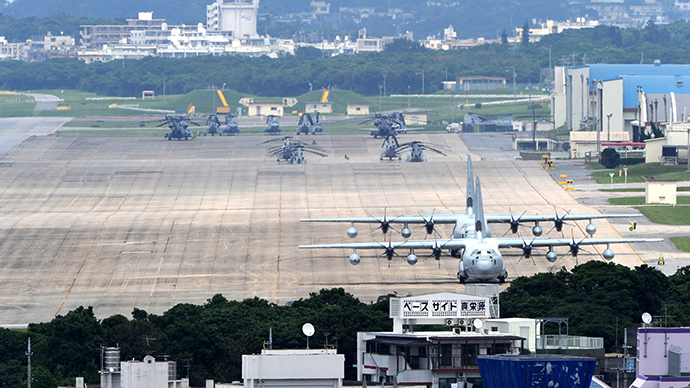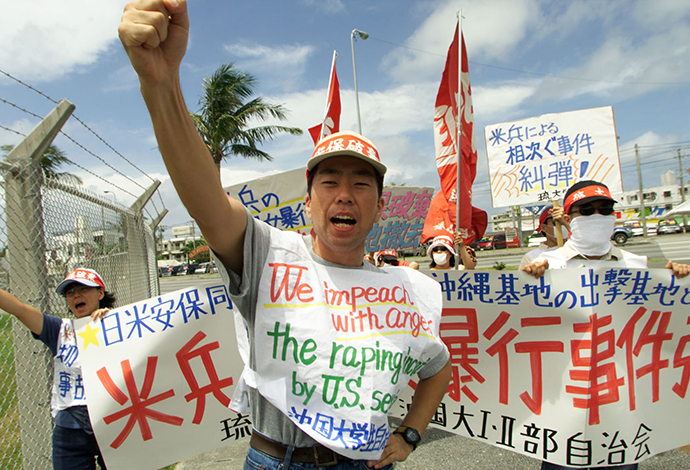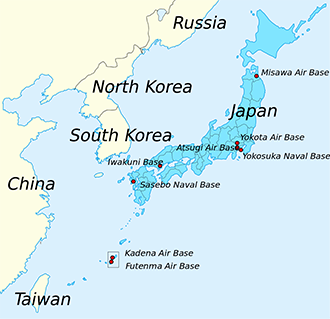'US base to move ahead in the face of Okinawan resistance’

Japan administration moves toward collective self-defense and transforms its military posture to get a free hand to take its military where it wishes, Mark Seldon, Senior Research Associate in the East Asia Program at Cornell University, told RT.
RT:Japan’s Prime Minister has been for long hoping to move the U.S. military base to Nago - why do you think the local politicians decided to resist that replacement?
Mark Seldon: They are resisting for the same reason that they have resisted this plan for more than 20 years. It starts with the fact that 74 percent of United States bases are located in Okinawa on 0.6 percent of the land. If you visit Okinawa you will find yourself overwhelmed. Anywhere you go you are virtually inside a base or at the edge of a base. The Okinawans have resisted this for decades, they have asked for relief from this. And that campaign continues with particular intensity because the Japanese government in the face of very strong Okinawan opposition demonstrated again in the local election in Nago, where the proposed new base is to be built, indicates the strength of that resistance.
RT:What exactly are they resisting and what are they unhappy about?
MS: They are unhappy, first, what began the movement of resistance to any new bases goes back to 1995 and a particularly horrific rape incident in which three US military personnel raped a 12 year old girl setting off the largest demonstrations in Okinawan history. That forced the United States to accept a major change in the structure of its bases there. It agreed to move the most dangerous of those bases. Donald Rumsfeld, the former Secretary of Defense, once called it the most dangerous place in the world, and [it was] probably so. They agreed to move that. What they didn`t say is where there were going to move it to. Since that time the Okinawans have fought to have it removed from the island, while the US and the Japanese were ignoring Okinawan public opinion, having insisted that they need to build a new base at Henogo in Northern Okinawa. So this is what the fight is about nowadays.

RT:For now the talk is only about the cancellation of a replacement base - but are we going to see further activity against the American presence in Japan as a whole?
MS: I don`t think that we will see the cancellation of the building of the base. I think that the base is on target to move ahead in the face of Okinawan resistance. The larger question is the question of the overall Japanese take on American military power. And I think to understand this we want to look at the moves by the current Abe administration to fundamentally transform Japan`s military posture to abolish, not by constitutional amendment, but by executive fiat the basic principle of Article 9, that is the peace clause of the Japanese constitution, and to move toward an extensive involvement and what the administration calls collective self-defense, something that Japan has not done in terms of direct involvement in fighting but has done in terms of supporting every single US war, from the Korean war to the present. The significance of the present stage is that it factually in effect abolishes the constitution provision, the famous article 9 peace clause, and gives the administration free hand to take its military where it wishes. This is particularly significant at the time when China-Japan conflict has increased dramatically in recent years. As you know the most immediate source of that conflict is competition over the ownership of the Sinkaku Islands occupied by Japan but also claimed by China. But it is aggravated by a series of other conflicts, for example, the prime minister`s visit to the famous [Yasukuni] shrine associate with Japan`s WWII crimes and other features of a more aggressive military posture. So Japan and China are at each other’s throats and this is a part of the reason why the Abe administration plans have very large potential dangerous consequences.
RT:The Defense Ministry said that it will continue the project of relocation despite the decision of politicians - that makes me wonder, how willing is central government to listen to the opinion of the regions?

MS: If the region refers to Okinawa it is clear that it is unwilling to even give it the most basic consideration, to even think about listening to the large protest. As I was mentioning, the election yesterday in Nago, the area where the new base is to be built elected a slate of assemblymen, 16 out of 27 of whom oppose the new base. The situation has a reason because the Governor of Okinawa, Nakaima Hirokazu who had opposed the base until last year suddenly shifted gears under tremendous pressure from the Abe administration, both carrots and sticks, large number of resources sent its way as well as high pressure, and accepted Japan`s claims that the environmental assessment process is complete and that the base can move ahead. This is another fabrication, the environmental assessment as basically has been put aside and the plan to deposit 21 million cubic meters of sand and rock in Hanako Bay at the side of the new area and the area among Japan`s most pristine aside from the endangered species. All of this with large consequences and part of the deep feeling that the Okinawan people have in opposing the base. But at the heart of that opposition really comes the realization by the Okinawan people that precisely the opposite logic which Japan and the United States claim, which is that the bases are the source of the Okinawan economy. Actually the case, the key reason why Okinawa is Japan`s poorest prefecture by far is precisely that its opportunity for development is precluded by the dominance of the bases everywhere in the island. Okinawans of the forward-looking variety are recognizing that their fate lies with another kind of economy with retaining control of their prefecture. For example a major tourist industry centered on China and the Chinese world has the possibility of opening up if they are able to regain control over their land. The issues are fundamental about the future of Okinawa and also about the future of Japan and Japan-China relations as well.
RT:There have also been reports of Japan increasing its own military capabilities - does that mean that Tokyo is looking for breaking out of military and security dependence on Washington?
MS: On the one hand, the Japanese move to engage in what it calls the collective self-defense, that means that Japan where the article 9 of constitution restricts it to defend the Japanese islands would, according to that interpretation, now be able to fight anywhere in the world to protect their interests in cooperation with its allies. Its allies means essentially the United States, sometimes the United States plus others, but basically the United States which has never left Okinawa, and has never left Japan and which has always dominated Japanese military policy and strategy which has provided a nuclear umbrella since the post-war period. This involves, in my view, a deepening of the US-Japan military alliance. What makes the issue complicated is that some of the members of Abe`s team, his neo-nationalist team which continues to revel in recalling the greatness of Japan during WWII which has no remorse for Japan`s war crimes at that time, some of those people are interested in seeing a much more autonomous Japan develop out of this. My own view is that the dominant direction of the military at this time of an expended military posture proposed by Abe is one that continues within the framework of American power. But for the future the possibility of a nuclear Japan, the possibility of the Japanese right wing dominating and deciding that they can no longer rely on the United States and Japan has to go it alone, those possibilities exist as well. I don`t think that they are immediate problems, however.
The statements, views and opinions expressed in this column are solely those of the author and do not necessarily represent those of RT.
The statements, views and opinions expressed in this column are solely those of the author and do not necessarily represent those of RT.












